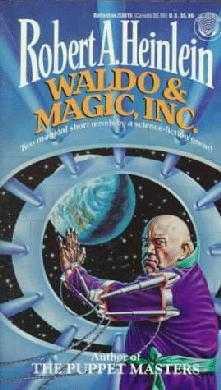Waldo (short story)

Waldo is a novella by Robert A. Heinlein originally published in 1942.
Waldo (after whom remote-control manipulatory machines are named IRL) is an expert technologist and problem solver who is called in when remote power receptors are failing mysteriously. But for all his technological prowess, Waldo finds that something more ethereal is the key to fixing them, and possibly himself.
Has nothing to do with Where's Waldo?
Tropes used in Waldo (short story) include:
- Brilliant but Lazy
- Does Not Like Shoes: Waldo doesn't like shoes because he has lived his entire life being unable to walk, so when he finally is able to do so, he avoids them as they make his feet feel dead. He only makes himself wear them when he has to.
- Genius Cripple
- Jerkass: Waldo, who dislikes people so much he only counts a single man among his friends and is quite happy to live off of Earth where he can't be bothered with people.
- Magic A Is Magic A: Waldo is an expert technologist and problem solver who is called in when remote power receptors are failing mysteriously. He finds that someone is fixing broken receptors by magic, and is told that magic can do anything -- no rules. He disbelieves this and proceeds to discover the rules of magic and applies them, becoming a very successful magician as well as technologist.
- Neologism: Author Robert A. Heinlein coined 'waldo' as a term for remotely controlled robotic arms. Specifically, a "waldo" is a device which is controlled by moving a model of the device; usually a pair of robotic hands that are controlled by sensors in a pair of gloves. This allows things to be worked on remotely or for someone to control a much larger/smaller version of their own hands.
This article is issued from Allthetropes. The text is licensed under Creative Commons - Attribution - Sharealike. Additional terms may apply for the media files.